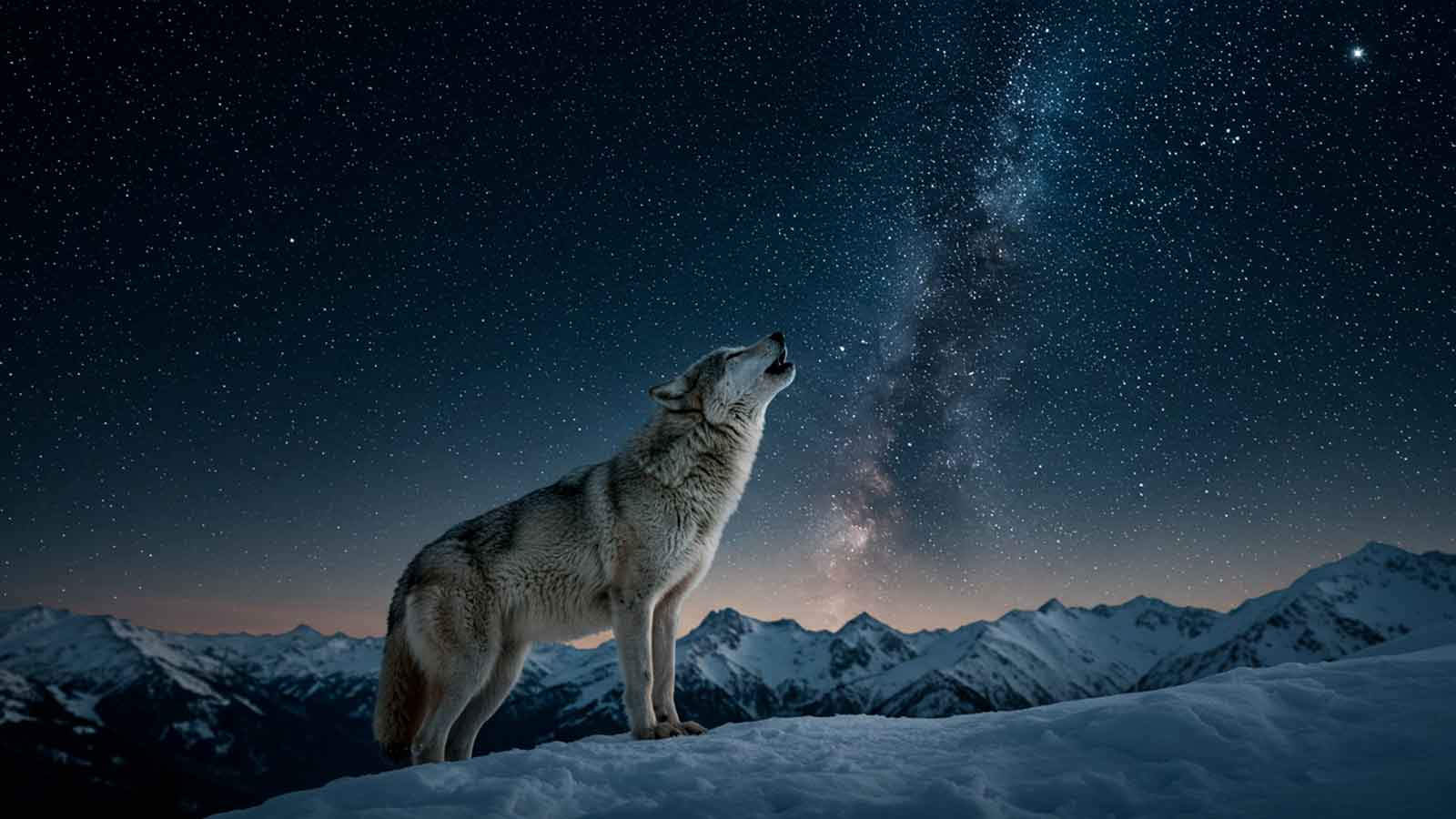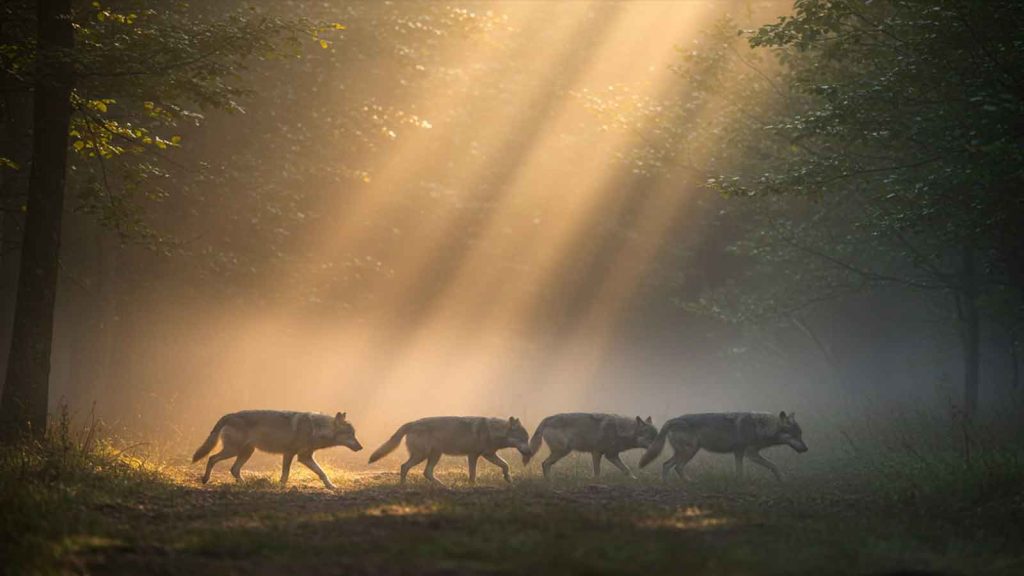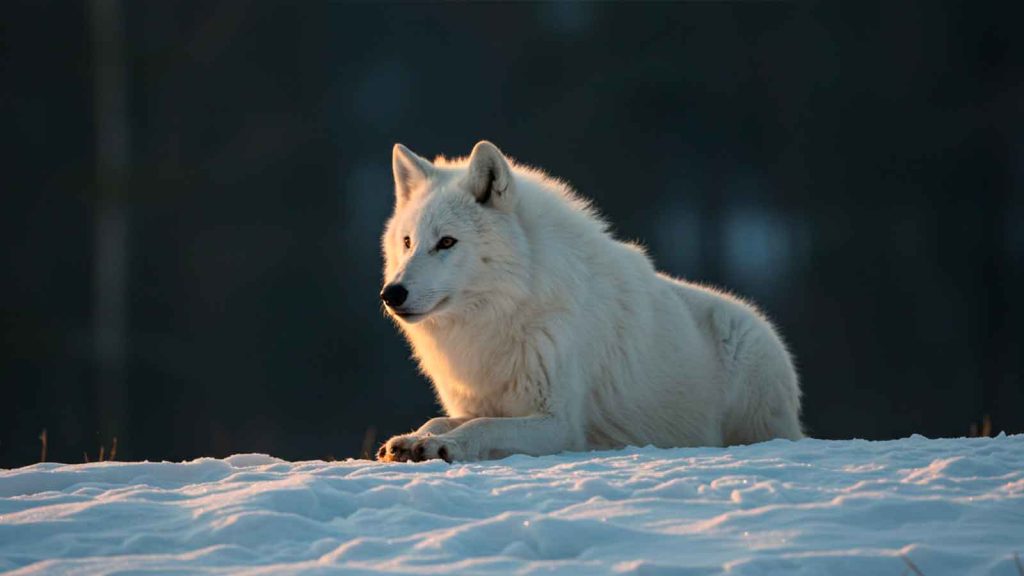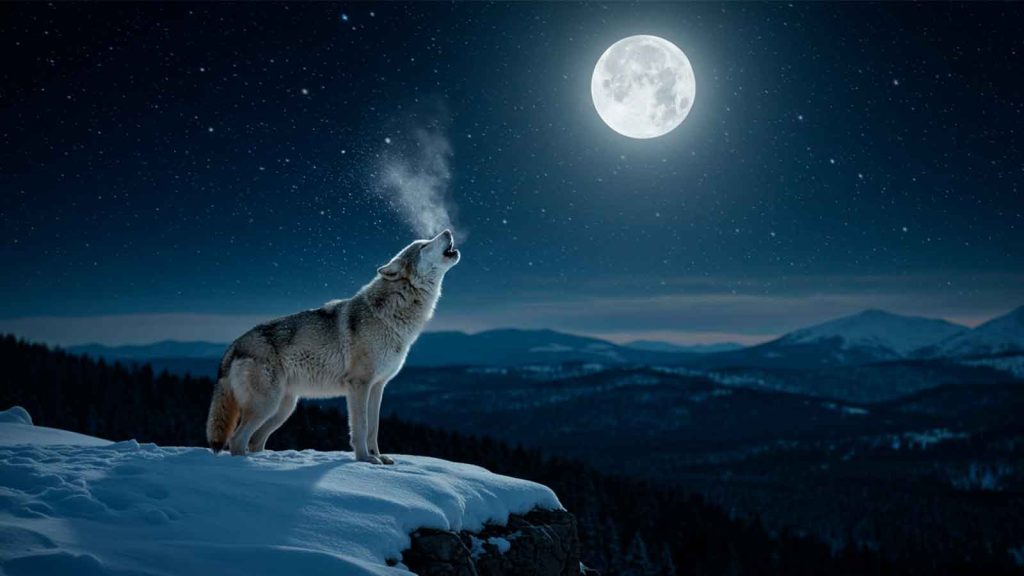Dreaming of a wolf is an intense and symbolic experience. These animals evoke respect, admiration, and even fear. Whether as a symbol of freedom, instinct, or power, the wolf in dreams can carry deep messages. In this article, we will explore what dreaming of a wolf can mean in different contexts and how to interpret these nightly visions.
The Symbolism of the Wolf in Dreams
Wolves are wild, strategic, and highly intuitive animals. They appear in legends, mythologies, and tales, often representing both protector and predator.
The Power of Instinct
The wolf is driven by its instincts. In a dream, it can represent your own connection to what is most primal and true within you. Dreaming of a wolf may be an invitation to listen to your intuition or a warning about uncontrolled impulses.
Independence and Freedom
Wolves often symbolize the desire for freedom and autonomy. If the wolf appears alone in the dream, it may reflect a moment in your life when you need to stand on your own and find your own path.
Pack Spirit
In other situations, the wolf appears in a group, representing the importance of community, protection, and loyalty. Dreaming of a wolf in a pack may indicate the need to reconnect with close people or to value strong bonds.

Meanings of Dreaming of a Wolf in Different Contexts
Dreaming of a wolf takes on varied meanings depending on the animal’s color, behavior, and the emotions it evokes in the dream. Below, see the main contexts with clear sub-topics for better understanding.
White Wolf in Dreams
Connection with Spirituality
Seeing a white wolf in dreams symbolizes purity, spiritual protection, and inner wisdom. It is a rare and powerful image, associated with spiritual guides and moments of emotional clarity.
Intuition and Inner Leadership
This dream indicates that you are connecting with your intuition and leading your own journey with confidence. Dreaming of a white wolf is a sign that you are aligned with your deepest values and should follow your inner voice.
Black Wolf in the Dream
Facing the Hidden Side
The black wolf represents what is hidden—repressed fears, intense impulses, and shadow aspects of the personality. It may signal a phase in which you are challenged to confront parts of yourself you would rather avoid.
Strength in the Shadows
Although it may seem negative, dreaming of a black wolf can also be a sign of ancestral power and resilience. It is an invitation to recognize quiet strengths within you, ready to be understood.
Wolf Attacking in the Dream
Representation of Conflict
If the wolf is aggressive in the dream, it points to internal tensions or external threats. It may symbolize conflicts with authoritarian people or the confrontation of repressed emotions such as anger or fear.
Reaction to the Attack
If you face the attack, the dream shows strength and readiness to solve problems. If you flee, it may indicate avoidance of difficult situations. Dreaming of a wolf attacking always requires reflection on how you handle pressure in real life.
Wolf Howling in the Dream
A Cry for Attention
The wolf’s howl is a call to action. Dreaming of a wolf howling represents a need to speak up, take a stand, or pay attention to something important that is being ignored.
Communication and Warning
It can symbolize loneliness, a need for connection, or a subconscious warning not to silence your feelings. It may also indicate that it is time to make your voice heard—emotionally, spiritually, or socially.
Friendly Wolf in Dreams
Positive Inner Strength
A tame wolf indicates balance between instinct and reason. Dreaming of a friendly wolf is one of the most positive signs: it represents protection, confidence, and the harmonious use of your inner strength.
Protective Presence
If the wolf walks beside you or lies down near you, it symbolizes loyalty and connection to your own soul. It is a sign that you are in a moment of emotional stability and self-confidence.

Dreaming of a Wolf in Different Colors
Gray Wolf
Gray indicates balance between reason and instinct. Dreaming of a gray wolf may symbolize transitional moments where there is uncertainty but also potential for growth.
Red Wolf
A red wolf symbolizes passion, intensity, and alertness. It may indicate emotional conflicts or a time when you are acting impulsively.
Blue Wolf
Blue represents the rational mind and calm. A blue wolf is a sign of emotional wisdom, self-control, and inner harmony.

Dreaming of a Wolf in Different Environments
Wolf in the Forest
If the wolf is in the forest, it reinforces the symbol of nature and instincts. It may indicate that you need to reconnect with your true self.
Wolf in the House
Seeing a wolf inside your house can represent something wild trying to invade your comfort zone. It may be a warning of approaching problems or an internal conflict emerging.
Wolf in Snow
Snow symbolizes silence and introspection. A wolf walking in the snow suggests that you are facing emotional challenges in silence and need to seek clarity.
Dreaming of a Wolf and Other Animals
Wolf and Dog
A dream with a wolf and a dog together may represent a conflict between instinct and domestication. You may be torn between acting on impulse or following established norms.
Wolf and Crow
The presence of a crow alongside the wolf suggests mystery and hidden messages. It may indicate that there is something in your life that needs to be revealed.
Wolf and Snake
This encounter represents conflicts between unconscious desires and deep fears. It is a dream that requires attention to your impulses and choices.

The Emotional Aspect of Dreaming of a Wolf
Dreaming of a wolf can strongly stir the emotions. The feelings during the dream—fear, calm, admiration—are important clues to interpret its message.
Feeling Fear
If you wake up frightened after dreaming of a wolf, you may be dealing with something unknown or dangerous in your life.
Feeling Peace
If the dream brings tranquility, the wolf may be acting as a spiritual guide or symbol of inner strength.
Feeling Anger
If the wolf evokes anger, perhaps you are projecting internal frustrations or feeling threatened in some personal relationship.
Cultural Curiosities About Wolves
Throughout history, the wolf has always held a special place in the human imagination. Whether as a symbol of power, spirituality, or leadership, its image is deeply rooted in mythologies, traditions, and beliefs around the world. Understanding these representations helps deepen the interpretation of dreaming of a wolf.
The Wolf in Native North American Culture
Among many Indigenous peoples of North America, the wolf is considered a power animal. It represents courage, strategic intelligence, and ancestral wisdom. Natives saw the wolf as a being that knew the secrets of nature and the human soul.
For some tribes, such as the Navajo and the Sioux, the wolf was a spiritual guide, appearing in visions and dreams to point out paths, warn of dangers, or show the moment to make important decisions. In these contexts, dreaming of a wolf was considered a gift—a form of communication with the spiritual world.
The She-Wolf in the Founding of Rome
In Roman mythology, the wolf appears in one of the most famous founding myths: the she-wolf who nursed the twins Romulus and Remus. According to legend, the brothers were abandoned in the Tiber River and saved by a she-wolf who raised them in her cave.
This story gave rise to the symbol of the city of Rome and immortalized the she-wolf as a protective mother and source of life. From this perspective, dreaming of a wolf, especially if it is female, may be related to themes of motherhood, protection, survival, and personal origins.
The Wolf in Shamanic Cultures
In shamanism—an ancient spiritual practice present among various nomadic and Indigenous peoples—the wolf is considered a totem of wisdom and transformation. It is one of the most respected spirit guides, appearing in inner journeys and healing rituals.
For shamans, the wolf symbolizes the balance between freedom and community, between individual strength and collective connection. It teaches how to walk between worlds—physical and spiritual—with courage and wisdom. Thus, dreaming of a wolf from a shamanic perspective can be understood as a call to a personal journey, to finding oneself.
The Wolf in Tales and Legends
Beyond spiritual beliefs, the wolf also appears in folk tales and children’s stories, such as the famous “Little Red Riding Hood.” In these cases, it represents disguised danger, the wild instinct lurking in the shadows. This imagery reinforces the wolf’s ambivalent side—both protector and threat.
These cultural constructions directly influence how dreaming of a wolf is interpreted. The historical and emotional context in which the symbol is placed will determine whether it represents something positive or challenging.
Differences Between Dreaming of a Wolf and Other Wild Animals
Dreaming of a wolf can cause some confusion when compared with dreams about other predators, such as lions, bears, or tigers. Although all these animals convey power, strength, and a striking presence, the wolf has symbolic particularities that make it unique in the language of dreams.
The Wolf and Pack Spirit
Unlike other wild animals, the wolf is known for its strong group sense. It lives, hunts, and protects in a pack. This social behavior is reflected in dreams as a call to loyalty, family unity, or need to belong.
Dreaming of a wolf can be directly linked to interpersonal relationships—something less common in dreams with more solitary animals such as the tiger, which symbolizes extreme independence and individual dominance.
Strategy and Intelligence
The wolf is one of the clearest symbols of strategy and silent observation. It does not act on impulse but with calculation and intuition. This differs, for example, from the bear, which represents brute strength and instinctive reaction.
While dreaming of a wolf may indicate that you are thinking before acting, weighing paths and assessing possibilities, dreaming of a bear tends to refer to emotional outbursts or direct confrontations.
Ambivalence: Threat and Protection
Another striking difference lies in the dual nature of the wolf in dreams. It can appear both as an enemy and a protector. It is an ambiguous symbol: the same creature that can attack can also guide.
Dreams with lions, for example, almost always indicate dominance, pride, and leadership—and rarely show that protective or sensitive side that the wolf can carry. This nuance makes dreaming of a wolf more connected to internal processes of self-knowledge and emotional transformation.
Inner Journey
Among all wild animals, the wolf is most linked to self-knowledge, the search for identity, and the exploration of the inner world. Many cultures see the wolf as a spiritual guide—one that helps in crossing important life phases.
While dreaming of a tiger may represent an explosion of desires or repressed urges, dreaming of a wolf usually suggests a deeper psychological crossing where reason and instinct try to find balance.
Freedom with Responsibility
The wolf also represents conscious freedom. It does not act in an uncontrolled way but with purpose. This contrasts with animals like the wild horse, a symbol of impulsive freedom. When we dream of a wolf, freedom comes accompanied by responsibility and awareness of the impact of our choices.
How to React After Dreaming of a Wolf
Engage in Personal Reflection
The first step after dreaming of a wolf is to reflect on your current life situation. What does this animal represent to you?
Record the Dream
Writing down the details of the dream as soon as you wake up helps capture sensations, symbols, and emotions that aid in interpretation.
Observe Patterns
If the dream repeats or arises at specific moments, it may be a sign that your subconscious is trying to convey something important.
Frequently Asked Questions About Dreaming of a Wolf
Is dreaming of a wolf good or bad?
It depends on the context. The wolf can be a sign of inner strength, freedom, or a warning of conflicts.
What does it mean to dream of being chased by a wolf?
It may represent repressed fears, a sense of threat, or the need to face a challenging situation.
Does dreaming of a wolf relate to important decisions?
Yes. These dreams often appear when we are unsure about which path to follow.
Is dreaming of a dead wolf negative?
It can symbolize the end of a cycle, the loss of inner strength, or the abandonment of your instincts.
What is the interpretation of dreaming of a wolf pup?
It represents protection, personal growth, and the start of a new cycle of self-knowledge.
Conclusion
Dreaming of a wolf is more than a simple dream image. It is an invitation to introspection, to connect with your instinct, and to balance reason and emotion. Whether the wolf is an ally or a challenge, it always carries a powerful message. Observing the emotions, environments, and details of the dream helps interpret more accurately what the inner universe is trying to communicate.
READ ALSO:
- Good Morning Blessed Wednesday: The 30 Best Phrases, Verses, and Psalms
- 50 Beautiful Verses to Strengthen Faith and the Heart
- Good Morning Thursday Blessings – Inspiration
FOLLOW US ON FACEBOOK